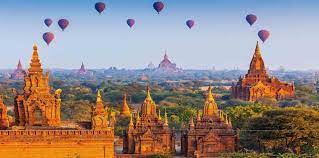
Burma (Myanmar) was folded on itself for a long time, as a military dictatorship was ruling the country with an iron fist. This Southeast Asian nation is now opening its doors to tourism and is becoming an increasingly popular destination. Visitors will be astonished by the beauty of Myanmar. The splendid ancient city of Bagan and its marvelous temples, Inle Lake and its picturesque villages, Yangon and its marvelous Shwedagon Pagoda… This is only a fraction of the countless treasures found in Burma… Add a population among the most hospitable on the planet and you easily understand the reasons of Myanmar’s sudden popularity.
HEALTH INFORMATION
We make every effort to ensure that the information posted on our website is up to date and accurate according to the latest public health recommendations; however, it is impossible for us to make changes on a daily basis.
For the most current travel health recommendations, please call our clinic as make an appointment with one of our travel health professionals.
MYANMAR (BURMA) – RECOMMENDED VACCINES
| The Yellow Fever Vaccine | A proof of vaccination against yellow fever may be required upon entry in to this country.
Some travellers may not be eligible to receive this vaccine. Please enquire with your health care professional regarding your specific details.
It is important to note that the vaccine should be administered at least 10 days prior to your departure.
For further information, please consult with the World Health Organization (WHO) website:
https://www.who.int/ith/ith- |
| Hepatitis A | Recommended for all travelers. |
| Hepatitis B | Recommended for all travelers. |
| Typhoid fever | Recommended for all travelers. |
| Tetanus – Diphteria – Pertussis Vaccine | Tetanus: In exceptional circumstances (eg, stay in a region where access to health care is limited), for a person aged 18 years or older, 1 dose of DT may be given if 5 years or more has elapsed since the last dose. Otherwise, one booster dose at the age of 50*. Pertussis (Whooping Cough): 1 dose is recommended for pregnant women, for every pregnancy, regardless of immunization history and the interval since the last dose (betwen week 26 and 32). *Only applicable for Quebec. |
| Polio | One-time booster recommended for any adult traveler who completed the childhood series but never had polio vaccine as an adult (after 18 years old only). |
| Measles – Rubella – Mumps | Two doses recommended for all travelers born after 1970, if not previously given. |
| Cholera | For humanitarian workers and health care providers. |
| Information, Advice & Vaccination – Japanese Encephalitis | Recommended for travelers who may visit rural regions and farms, especially those traveling for a month or more, recommended for those spending a lot of time outdoors, such as camping, hiking, bicycling or working in the field, especially after dusk. The risk of japanese is particularly elevated during monsoon season. The period of Monsoon season varies based on the areas visited. Important to note, that vaccination against Japanese Encephalitis is administered in 2 doses with a minimum time delay between doses. |
| Flu – Influenza | Seasonal influenza occurs worldwide. The flu season usually runs from November to April in the northern hemisphere, between April and October in the southern hemisphere and year round in the tropics. Influenza (flu) is caused by a virus spread from person to person through coughing and sneezing or by touching infected surfaces. Everyone 6 months and older should get a flu vaccine yearly. Vaccine is recommended 14 days prior to departure. |
| Routine vaccines (dCaT, Polio, Meningococcal, Shingles, Pneumococcal, Hepatitis B, HPV, MMR & Varicella) | Recommended for all travelers |
| Rabies | For travelers at high risk of animal bites or being involved in activities with bats, dogs and other mammals. Clients who plan to visit remote areas may consider receiving this vaccine. Important to note the pre-exposure rabies vaccine is administered in 2 doses with one week interval between doses. Post-exposure vaccination is always recommended, even for those previously vaccinated. |
| Travellers’ diarrhea | Talk to your health care professional about the risks and precautionary measures to take, as well as the Dukoral® vaccine. Important to note that the Dukoral vaccine is an oral vaccine given in 2 doses, recommended at least 2 weeks prior to departure. |
| Malaria | Malaria is present in this country. The risk may be region specific. Prophylaxis measures to be discussed with the health care professional. |
| Dengue Fever, Chikungunya and/or Zika | There are many illnesses that are transmitted via mosquito bites and unfortunately we do not have vaccines to protect us against most of them. It is important to inquire with your healthcare professional regarding the specific risks and the different illnesses presently in circulation. |
RECOMMENDED MEDICATIONS
| Acetazolamide/Dexaméthasone | Recommended to prevent Acute mountain sickness (AMS). |
| Antimalarials Recommended | Malarone, Doxycycline |
| Antibiotics Traveler’s Diarrhea | Azithromycin or Suprax |
SECURITY ABROAD
CANADIAN EMBASSY
Emergency services
In case of emergency, dial:
- police: 199
- medical assistance: 192
- firefighters: 191
